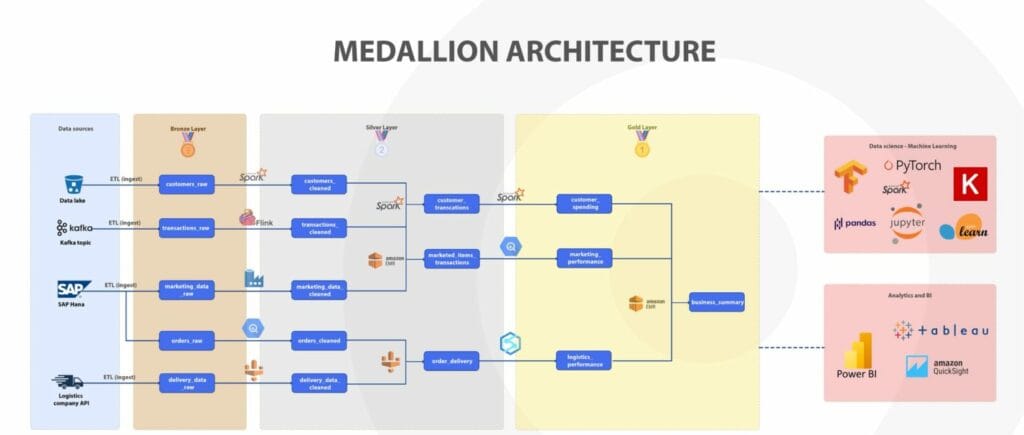AI: A Buzzword or a Business Imperative?
For years, artificial intelligence has been a topic of fascination, innovation, and, at times, skepticism. But today, AI is no longer just a promising concept. It has become a critical driver of business transformation. Companies worldwide are racing to integrate AI into their operations, looking for ways to optimize decision-making, automate processes, and create entirely new business models.
Yet, there’s a fundamental truth often overlooked in this AI revolution: AI is only as good as the data it learns from.
In our recent webinar, Architecting AI Success with Data and Cloud, we explored what it really takes to build AI-powered systems that deliver real, tangible value. And the answer? It all starts with data.
Why Data Quality Is the #1 AI Challenge
A recent McKinsey survey revealed that data analytics and AI platforms are now the top investment priorities for businesses. The rapid rise of generative AI has only accelerated this trend, forcing companies to rethink their data strategies.
But as organisations rush to adopt AI, many face an unexpected roadblock: data inaccuracy. In fact, 44% of companies have reported major issues due to poor data quality. AI models can be trained on vast amounts of information, but if that information is flawed, biased, or incomplete, the results can be not just inaccurate, but dangerously misleading.
The takeaway is clear: data isn’t just fuel for AI. It’s the foundation. And without a solid foundation, even the most advanced AI models will crumble.
Architecting AI for Success: Five Key Principles
1. Data: It’s About Quality, Not Just Quantity
There’s a persistent myth in AI that more data is always better. But that’s simply not true. Many organizations fall into the trap of collecting massive amounts of data, only to realize later that much of it is irrelevant, noisy, or incomplete.
Instead of hoarding data, businesses should focus on curating high-quality, well-structured datasets. In other words, AI success isn’t about having the most data—it’s about having the right data.
"Without well-prepared data, even the most advanced AI models can produce inaccurate or misleading results"
2. The Cloud Is No Longer Optional
Once upon a time, companies debated whether they should move to the cloud. Today, that debate is over. AI and data-driven businesses thrive on flexibility, scalability, and speed—all of which are best achieved in the cloud.
Migrating from on-premise systems to cloud platforms allows companies to:
- Scale AI initiatives quickly
- Leverage cutting-edge AI tools
- Reduce infrastructure complexity
- Enable real-time data processing
However, not all cloud strategies are created equal. Many organisations are now embracing multi-cloud and cloud-agnostic approaches, ensuring they aren’t locked into a single vendor while maximising the best features of different platforms.
"A cloud-agnostic strategy gives businesses the flexibility to scale without vendor lock-in."
3. Data Architecture: A Blueprint for AI Success
Even with high-quality data, how that data is structured makes all the difference. A chaotic, unorganized data ecosystem can cripple AI initiatives before they even begin.
One of the most effective frameworks for structuring AI-ready data is the Medallion Architecture, which organizes data into three layers:
- Bronze Layer: Raw, unfiltered data (collected but not yet refined).
- Silver Layer: Cleaned, enriched, and structured data.
- Gold Layer: Business-ready data used for AI models and decision-making.

A key benefit of structuring data in three layers is performance optimisation, ensuring that the data is appropriately organised to achieve fast and efficient retrieval times.
By reducing complexity and structuring information effectively, this approach ensures that AI models don’t have to sift through messy, unstructured data. Instead, they work with clean, high-quality information, leading to better accuracy and more reliable predictions.
4. Security and Compliance: The Often Overlooked AI Risk
AI doesn’t just bring opportunities, it also brings risks. Rushing to compete with the market often leads to overlooking security vulnerabilities which are a popular target in freshly deployed AI products. From biased models to cyber threats, businesses must prioritise AI security from day one.
One of the biggest concerns in AI today is data privacy. With strict regulations like GDPR in the EU and increasing scrutiny worldwide, organizations must ensure that AI models comply with data protection laws. That means investing in robust data governance, encryption, and ethical AI practices, not as an afterthought, but as a core strategy.
"Security and governance must be part of AI projects from day one, not an afterthought."
5. AI Model Selection: The Right Tool for the Right Job
Not all AI models are created equal. Some businesses benefit from generalist AI models (like ChatGPT and other LLMs) that handle a wide range of tasks. Others need specialized AI models that are fine-tuned for specific use cases.
Choosing between a generalist or a specialist AI approach depends on:
- The complexity of the problem
- The level of accuracy required
- The cost of training and maintaining the model
For example, a large-scale recommendation system might benefit from a generalist model, while a fraud detection system in banking might require a specialized AI trained on financial data.
"AI doesn’t start with models. It starts with the right data foundation."
The Future: Where AI, Data, and Cloud Converge
As businesses continue their AI journey, one thing is certain: those who invest in high-quality data, leverage the cloud wisely, and adopt structured AI strategies will have the edge.
Companies that succeed in AI aren’t the ones rushing to deploy the latest model. They’re the ones thoughtfully building the right foundation. And that foundation starts with clean, structured, and well-governed data.
The next big breakthroughs in AI won’t come from bigger models alone. They will come from better data, smarter infrastructure, and stronger security.
AI is here to stay. The question is: will your data be ready?









